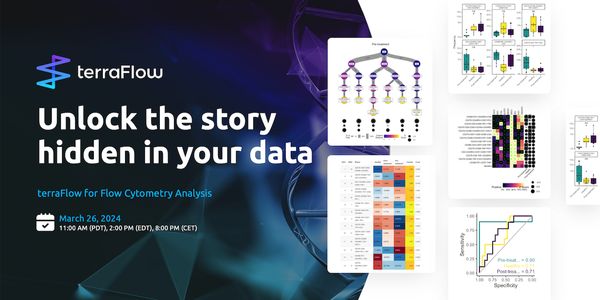NOV 09, 2023 | 6:00 AM
In this talk we will explore the application of Multiplexed Error-Robust Fluorescence in situ Hybridization (MERFISH) technology to decode spatially regulated disease drivers in human heart...
NOV 08, 2023 | 8:00 AM
SiO2 Materials Science is a company with deep roots in materials science and engineering and a track record of innovative packaging products for pharmaceutical drugs. The company also manufa...
OCT 10, 2023 | 10:00 AM
For patients with advanced non-small cell lung cancer (NSCLC), tissue samples are typically small biopsies. These samples undergo standard of care evaluation for >10 biomarkers to identif...
SEP 26, 2023 | 11:00 AM
Multicolor flow cytometry is beneficial because it allows us to gain deeper insights from a given biological sample, with fewer repeat markers in each tube and quicker results. In this three...
AUG 01, 2023 | 10:00 AM
Human cytomegalovirus (CMV) infection is common and usually results in a mild, non-specific illness in otherwise healthy individuals followed by asymptomatic latency. However, congenital CMV...
JUL 26, 2023 | 8:30 PM
Differences in how users gate populations within experiments are major sources of variability in flow cytometry data analysis. Incorporating automated image analysis can substantially reduce...
JUL 26, 2023 | 8:00 AM
Differences in how users gate populations within experiments are major sources of variability in flow...
JUL 20, 2023 | 8:00 AM
Single-cell ATAC-seq (Assay for Transposase-Accessible Chromatin using sequencing, scATAC-seq) is a relatively new and powerful technique that allows researchers to identify open chromatin r...
JUL 11, 2023 | 8:00 AM
Our understanding of cancer mechanisms, genetics and complexities continues to expand rapidly. Without a streamlined, standardized and easy to understand organizational system to keep track...
JUN 08, 2023 | 9:00 AM
In the emergency department, distinguishing between bacterial and viral infections can be challenging, leading to inappropriate use of antibiotics that may contribute to the development of b...
APR 05, 2023 | 11:00 AM
Date: April 05, 2023 Time: 11:00am (NZDT) Date: April 04, 2023 Time: 4:00pm (PST), 7:00pm (EST), 1:00pm (CET) Polymerase chain reaction (PCR) technology-based testing method has been widely...
Clinical laboratories worldwide are implementing various targeted panels to identify cancer genomic variants and ultimately improve patient outcomes. As most of the panels and NGS platforms ...
Clinical laboratories worldwide are implementing various targeted panels to identify cancer genomic variants and ultimately improve patient outcomes. As most of the panels and NGS platforms...






















